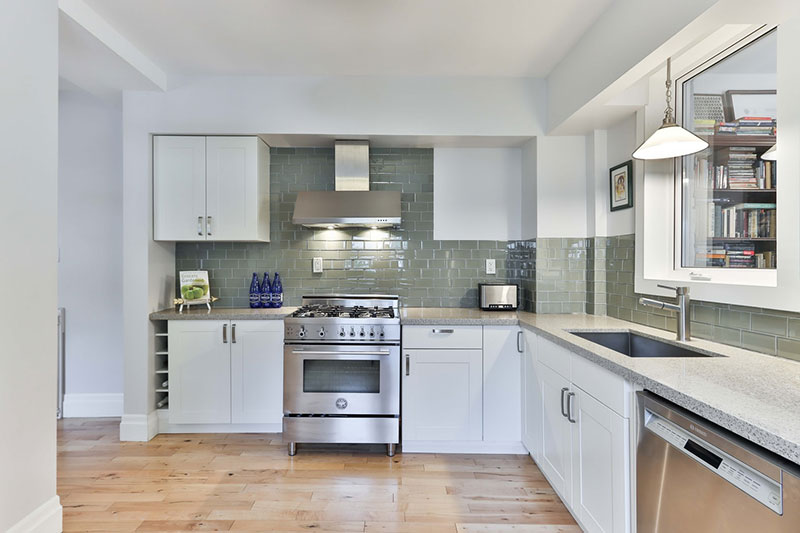With rental properties on the rise, owning a rental property can be incredibly lucrative, but being a first-time landlord can sometimes be overwhelming. However, there are some helpful tips that can make managing your rental property a bit easier, and furnishings you can choose that can increase the value of your rental property, ultimately attracting more tenants. Below is our expert advice that can help every new landlord effectively manage their property, create a place that will attract tenants, protect themselves from potential issues, and reduce stress and headaches.
Install Hardwoods
Skip any carpeting and consider installing hardwoods in your rental property, as they’re worth the initial investment. Not only do hardwood floors increase the value of your home, most renters look for them and they’re also easier to clean, more durable than alternative flooring, and last for an incredibly long time, saving you money in the long run.
Stick to a Neutral Palette
When choosing a color palette for your rental property, it’s important to keep your personal taste out of it. You’re designing a home for the majority, not for yourself. Stay away from trends that can quickly look dated in a couple of years. Stick to a neutral color palette when it comes to flooring, wall color, and other furnishings. Neutral colors are timeless, go with everything, and you won’t scare any renters away by your personal taste.
Screen Your Tenants
With a rental property, your main source of income is going to obviously come from renting your property. Probably the most challenging part of a rental property is finding good, reliable tenants that will protect your property like it’s their own and pay rent on time— that’s why it’s crucial to thoroughly screen your tenants during the application process. You may want to do a background check, credit report, check their rental history and income, and you also may want to consider if you’d like to have a no pet policy or not. This screening process will help you ween out tenants you may not want living in your property, ultimately saving you from problems and headaches down the road.
Have a Thorough Lease Agreement
A lease agreement is a binding contract that clarifies everything the landlord and tenants can and cannot do and also states the consequences if the agreement is broken. For example, you may want to create clauses in the lease about what you will and will not allow in terms of changes or renovations to the home or if you will allow pets. Creating a thorough lease is crucial when you’re a landlord, as it protects you and your property. It’s important both you and the tenant understand your roles and responsibilities within the lease. When creating your lease agreement, it’s important to follow the tenant-landlord laws within the state your property is located. If you need any assistance, a real estate attorney can help you draw up a comprehensive lease agreement. Alternatively, you can get one here.
Be Professional
To ensure things run seamlessly, treat your rental property as a business. While it’s important to create a good relationship with your tenants and be kind and understanding, you want your tenants to take you seriously and not try to take advantage of you. Your communication with your tenants should be clear and professional. Follow through with the terms of your lease agreement, keep your property well-maintained, and fix any repairs promptly. While you may think it could be good to rent to friends and family, you may want to steer clear of that to protect your relationship and your business as people close to you are more likely to try to get freebies.
Find a Reliable Handyman
Regardless of how well you maintain your property, things are bound to break or need repairs every now and then. It’s important to have a good reliable handyman on call that you can contact when things need to be fixed or replaced, as this will save you a lot of time and headache from trying to fix things yourself. You want to keep the property well maintained and fix things in a timely manner to not only keep your property looking its best and worth its value, but to also keep a good rapport with your tenants.
Know and Follow the Laws
As a landlord, it’s essential you know and follow the fair housing laws for your state. The American Apartment Owners Association provides all the resources you need on housing laws based on the state your property is in. Being fully aware of these laws will protect you and your property and keep you out of any potential lawsuits that could arise.
Provide Incentives to Keep Good Tenants
If you’re lucky enough to find great tenants, you want to ensure you keep them. The best way to do this is by creating incentives to motivate them to stay in your rental property. Upon their lease renewal, you may want to offer to upgrade or replace something in the property of their choice up to a certain value depending on your budget — fresh wall paint, a new appliance, new flooring, or new furnishings. Giving them the freedom to choose which item they’d like to upgrade lets them feel heard and gives them a sense of ownership of the home they’re living in.
